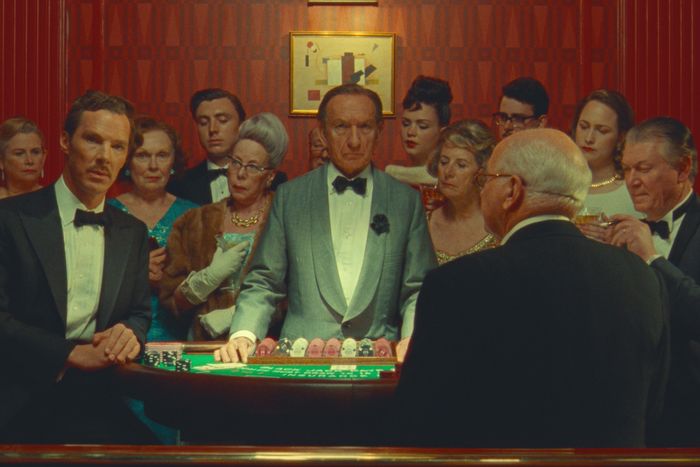
Warning: This article discusses plot details of all four of Wes Anderson’s new shorts, three of which are streaming on Netflix now and one of which will debut tomorrow.
The new Wes Anderson short films based on the stories of Roald Dahl’s begin with Sugar and end with Poison. To be more specific, they start with The Wonderful Story of Henry Sugar, a tale about a man (played by Benedict Cumberbatch) turning to altruism. They end with Poison, in which a character, also portrayed by Cumberbatch, reveals himself to be a coldhearted racist.
These four shorts have begun dropping on Netflix as separate installments on consecutive days, starting on Wednesday. But they are actually best watched all at once. While the marquee title, The Wonderful Story of Henry Sugar, is fantastic on its own — a meticulous mashing of Anderson’s style and Dahl’s prose — together the shorts make up a much more disturbing and complicated cinematic exploration of the author’s work. (When the project’s casting was initially reported in the trades, it appeared as though we were getting one film. Instead, we’ve gotten several. Sort of.)
Netflix, which acquired the rights to Dahl’s catalogue in 2021, is certainly touting Henry Sugar above the rest. The longest of the bunch, at 39 minutes, it received a premiere at the Venice Film Festival and is getting a theatrical release. It will presumably be in the running for Oscar consideration. But the sweet, easy-to-digest Henry Sugar alone is not a very good bellwether for the rest of what Anderson is trying to do and how he’s engaging with the troublesome legacy of Dahl himself, who appears onscreen as a character played by Ralph Fiennes, describing his writing process and narrating his own work.
That film tells the story of the eponymous gadabout (Cumberbatch), a wealthy dandy who stumbles upon a written account by a doctor from Bombay (Dev Patel). It describes the doctor’s encounter with a man, Imdad Khan (Ben Kingsley), who “sees without his eyes.” Henry Sugar sets out to train himself to do the same to win at cards — except once he starts acquiring a fortune, the money means nothing to him. In the end, he travels the world using disguises to avoid detection by casinos and gives away all the money to children’s hospitals and orphanages.
It’s downright heartwarming. As Vulture’s Bilge Ebiri wrote in his review, the film has “a quaint, almost naïve optimism.”
But start to watch the rest of Anderson’s shorts and that optimism curdles. The Swan is a fable about a boy who is mercilessly bullied. The Rat Catcher is about a man (Fiennes) whose philosophy of rat-catching involves acting like one of the creatures himself and, at one point, killing a rat with his teeth. While the color palette of Henry Sugar is lush, with vibrant reds and blues, all the color is drained from these two later stories.
And then there’s maybe the most upsetting of them all: Poison. It follows an Englishman in British-occupied India named Harry Pope (Cumberbatch), who finds a poisonous snake called a “krait” in his bed. He is attempting to remain extra still when an Indian doctor, Dr. Ganderbai (Kingsley), comes to help him. Dr. Ganderbai orchestrates a plan to safely extricate the krait without startling it and causing it to bite and kill the man. When all is said and done, and the blanket removed, there is no krait at all. Rather than thanking the doctor for his work, Cumberbatch’s character lashes out at him, implying that he’s calling him a liar and spewing racial slurs. The doctor takes it in stride.
To begin with Henry Sugar and end with Poison, which debuts last, is to grapple with an unsettling parallelism. Of all the shorts, those two are the most similarly cast with Cumberbatch, Patel, and Kingsley in key roles. And while, in the former, Cumberbatch’s character learns from Kingsley’s and ultimately becomes a better human, in the latter Cumberbatch denigrates Kingsley. Even the way the shorts approach India changes. The country has long been a subject of fascination for Anderson — which for some bleeds into fetishization, like in the case of The Darjeeling Limited. In Henry Sugar, India is a place of magic. In Poison, it’s where British rule is suffocating.
Anderson’s work has long been darker than the TikTok memes that reduce it to a filter, aping its aesthetic and nothing else. The specter of violence often hangs in the corners of his perfectly constructed frames — the fascism implicit in The Grand Budapest Hotel or the suicidal melancholy in The Royal Tenenbaums, for instance. Collectively, these shorts are his grimmest output yet. Only one is about a man choosing selflessness; the rest are all in some ways about human cruelty.
And then there’s the Dahl of it all. To discuss Dahl is to discuss a beloved children’s author and a virulent antisemite and racist, but most adaptations of his work don’t really grapple with Dahl himself. Certainly not the last Netflix Dahl movie: the (delightful, to be clear) Matilda musical. Anderson puts Dahl front and center, even personifying him onscreen. There’s a discomfort in this. You are immediately confronted with this man whose hatred of Jews is almost as renowned as his storytelling. This seems especially at odds with Henry Sugar and its message of altruism. But as you spend more time with the shorts, centering Dahl starts to make sense.
Individually, each short is a brilliantly executed, faithful adaptation filled with Anderson’s technical mastery. You can spend your time just marveling at the choreography and the way the set pieces move. And yet watched as one, they make a case for the multitudes people contain: the capacity for wonder and kindness as well as unrepentant bigotry and meanness. It’s a statement on humanity, yes, but also on Dahl himself.

